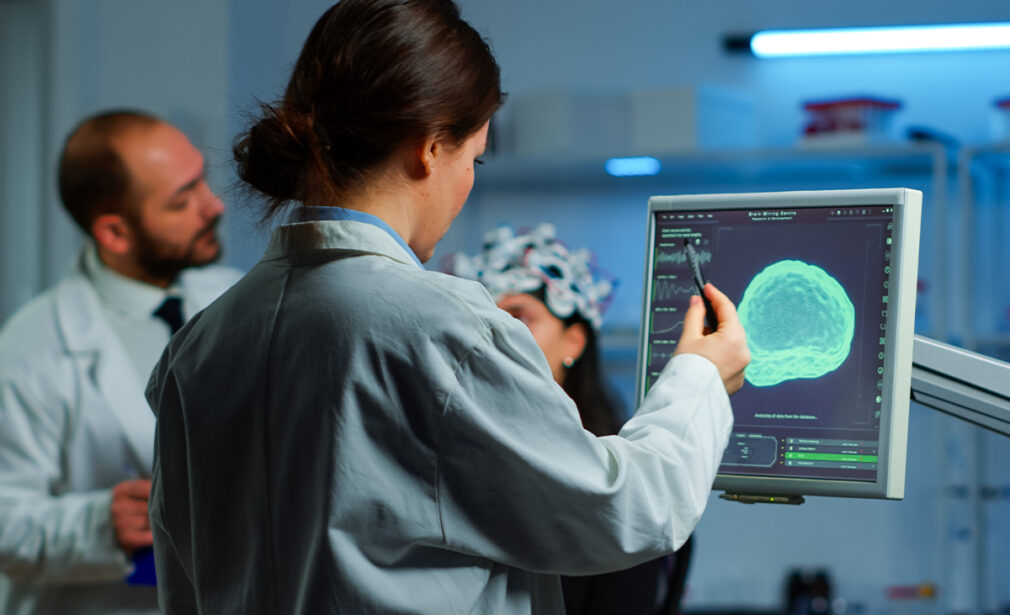Neurology
Vasundhara Hospital aims to provide comprehensive care to diagnose and treat people with brain and nervous system disorders. Our team of highly qualified doctors are specialities in many services like Stroke Clinic, Epilepsy, Parkinsonism and Related Disorder, Migraine and all type of headaches, Back and Cervical Pain, Muscle Weakness etc.
All the advanced lab investigations studies like NCV (Nerve Conduction Study), EMG (Electro Myo Graphy), RNS (Repetitive Nerve Stimulation), VEP (Visual Evoked Potentials) and EEG (Electro Encephalo Gram) and Imaging studies like advanced MRI scans and CT scans, are available on hospital. A complete Neuro Unit is functional from 10 AM till 3 PM, Monday till Saturday.
Neuro Services at our Centre
- Stroke Clinic
- Epilepsy
- Neuropathy
- Memory Disturbance
- Sleep Problems
- Vertigo and Dizziness
- Botox therapy
- Back and Cervical Pain
- Muscle weakness
- Cerebral Palsy Investigations
- Abnormal moments and sensation
- Parkinsonism and Related Disorder
- All types of Infections of Brain
- NCV (Nerve Conduction Study)
- EMG (Electro Myo Graphy)
- VEP (Visual Evoked Potentials)
- EEG (Electro Encephalo Gram)
- RNS (Repetitive Nerve Stimulation)
- Migraine and All type of Headaches
Frequently asked questions
Accordion Content
If you experience following symptoms then you should definitely visit a neurologist :
- Headaches: Frequent, severe, or unusual headaches, especially if accompanied by other symptoms like vision changes, nausea, vomiting, or neurological deficits. For instance, a sudden, severe headache could be a sign of a subarachnoid hemorrhage.
- Seizures: Any episode of involuntary muscle contractions, loss of consciousness, or altered awareness could indicate a seizure disorder like epilepsy.
- Weakness or numbness: Sudden or progressive weakness, numbness, or tingling in the face, arms, legs, or one side of the body can be a sign of various neurological conditions, including stroke, multiple sclerosis, or peripheral neuropathy.
- Balance problems or dizziness: Persistent dizziness, vertigo, or difficulty with balance and coordination can be related to inner ear problems or neurological conditions.
- Memory problems or cognitive changes: Significant memory loss, confusion, difficulty with language, or changes in thinking abilities may indicate conditions like Alzheimer’s disease or other forms of dementia.
- Movement disorders: Tremors, stiffness, slowness of movement, or involuntary movements can be symptoms of Parkinson’s disease or other movement disorders.
- Sleep disorders: Persistent insomnia, excessive daytime sleepiness, restless legs syndrome, or other sleep disturbances can sometimes be related to neurological issues.
- Chronic pain: Certain types of chronic pain, such as neuropathy (nerve pain), can be managed by a neurologist.
- Vision problems: Sudden vision loss, double vision, or other visual disturbances can sometimes have neurological causes.
Neurologists utilize various diagnostic tests to evaluate the function and structure of the nervous system. Some common tests include:
- Neurological Examination: A comprehensive assessment of a patient’s mental status, cranial nerves, motor function, sensory function, reflexes, coordination, and gait. This is a crucial first step in diagnosis.
- Electroencephalogram (EEG): A test that measures the electrical activity of the brain using electrodes placed on the scalp. It is commonly used to diagnose epilepsy and other brain disorders.
- Electromyography (EMG) and Nerve Conduction Studies (NCS): These tests evaluate the function of muscles and peripheral nerves. EMG measures the electrical activity of muscles, while NCS measures how fast and well electrical signals travel along nerves. They are often used to diagnose conditions like neuropathy, carpal tunnel syndrome, and neuromuscular disorders.
- Magnetic Resonance Imaging (MRI): A powerful imaging technique that uses magnetic fields and radio waves to create detailed images of the brain, spinal cord, and nerves. MRI is valuable for detecting tumors, stroke, MS plaques, and other structural abnormalities.
- Computed Tomography (CT) scan: An imaging technique that uses X-rays to create cross-sectional images of the brain and spinal cord. CT scans are often used in emergency situations, such as suspected stroke or head trauma.
- Lumbar Puncture (Spinal Tap): A procedure in which a needle is inserted into the lower back to collect cerebrospinal fluid (CSF). CSF analysis can help diagnose infections, inflammation, and other neurological conditions.
- Blood tests: Various blood tests can help identify underlying medical conditions that may be affecting the nervous system.
- Genetic testing: In some cases, genetic testing may be used to diagnose inherited neurological disorders.
The treatment for a neurological condition depends entirely on the specific diagnosis and its severity. Neurologists primarily use medical management, which may include:
- Medications: A wide range of medications are used to treat neurological disorders, such as anticonvulsants for epilepsy, anti-inflammatory drugs for multiple sclerosis, dopamine agonists for Parkinson’s disease, and triptans for migraine.
- Physical therapy: Can help improve strength, balance, coordination, and mobility in patients with neurological conditions.
- Occupational therapy: Focuses on helping patients regain skills needed for daily living.
- Speech therapy: Can assist with communication and swallowing difficulties that may arise from neurological disorders.
- Pain management: Neurologists often manage chronic pain associated with nerve damage or other neurological conditions through medications, nerve blocks, and other therapies.
- Lifestyle modifications: In some cases, lifestyle changes such as diet, exercise, and stress management can play a role in managing neurological conditions.
- Injections: Procedures like Botox injections can be used to treat certain neurological conditions, such as dystonia or chronic migraine.

